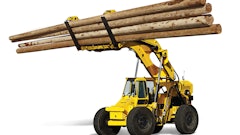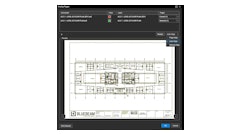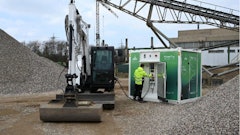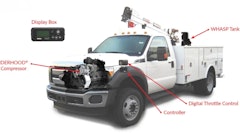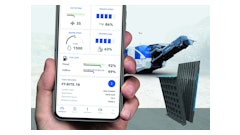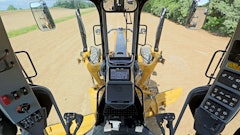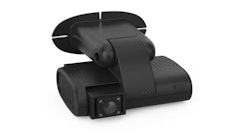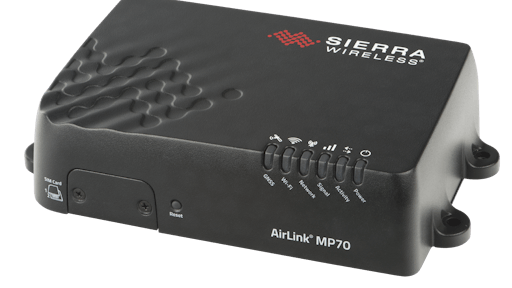
Discussion about affordable information-technology solutions at the Associated General Contractors’ IT Forum moved immediately to the subject of improving jobsite wireless connectivity. An open-mic format, which did not identify those who shared their experience, did identify several hardware options that construction-company IT professionals have been using to improve data flow to and from remote jobsites.
Solid Internet to Remote Sites
“We’re a bridge construction company, and we work out in the middle of nowhere, typically where there’s no internet access or wireless,” said the first construction IT pro who stepped to a microphone. “Sierra Wireless just released a (cellular) router built for mobile applications that has two SIM-card slots so I can put a Verizon wireless card in one and AT&T card in the other. It puts out a large Wi-Fi hotspot, it’s got great throughput and it’s got four or six ports in the back so you can hard-wire printers, an onsite server or whatever. It worked really well for us.”
The Sierra Wireless AirLink MP70 (about $1,000) is an LTE-Advanced vehicle router for connecting mission-critical field services. It provides secure, managed connectivity for applications with LTE-Advanced, gigabit Wi-Fi and gigabit ethernet, enabling multiple high-bandwidth applications to work simultaneously.
Public safety – police, fire, emergency medical responders – is a key market for the MP70, and to give an idea of the router’s capacity, Dave Markland, senior product manager of gateway solutions for Sierra Wireless, says, "A typical law enforcement vehicle hosts a laptop for dispatch and records management, an electronic citation system, live digital video surveillance, body-worn cameras and automated license plate recognition systems."
The MP70 is designed so that all of these systems can connect to the router’s high-speed network, with both gigabit ethernet and 802.11ac Wi-Fi.
“With the two SIM cards, one is active at any time,” the bridge builder’s IT pro explained to AGC’s IT Forum. “Our jobsites are across the U.S., and Verizon works for us better in some places; AT&T in others. AT&T and Verizon each charge us about $20 a month just to have the cards. But we can send that router out to a jobsite, and whichever works best for the guys in the field, they can put in that top slot.
“The antenna is tethered with a 15-ft cable. You can get it with a pole or magnet mount and put the antenna on top of a vehicle or on top of your office trailer. It works super.”
Another attendee at the AGC IT Forum recommended CradlePoint cellular routers as very similar alternatives.
“It’s the same concept as the Sierra Wireless Airlink, and you get very good throughput with two SIM cards. Plus, if you run over your data limit on one of the cards, it will automatically switch from the card that’s over to the other.”
An IT Forum attendee who said his company has used CradlePoint and Verizon routers pointed out that he was now moving toward using Meraki routers.
“The CradlePoints and Verizons all work great for one-on-one locations as long as you’ve got good service,” he said. “We’ve been integrating Meraki for three years now, and it’s an amazing product. There’s a new router called the Meraki MX65W (about $850). It’s fully cloud managed, and while you have eight LAN ports, it also has two POE (power over ethernet) ports.”
The POE ports allow a network cable to carry not only a network connection to a device, but power to run that device.
“For guys like us who don’t have just one trailer on a construction site – we’ve got two, three, four, five trailers – the two POE ports allow you to run access points into a conference-room or other type of trailer, and to have it all built into one tiny device that I can ship to the jobsite. We send them with a USB Verizon card they can plug into the back, and they’re immediately up and running within five minutes.”
The contractor is using the POE ports for our voice-over-IP phones, among other things.
“We have office project managers who can take their phones to jobsites and just plug in, if they’re just going to be out on the job for a day,” rather than have to run another phone line to the job trailer.
Recommended Cell-Signal Boosters
Contractors frustrated with weak signal using 4G LTE wireless routers on site will appreciate this lead on a waning, inexpensive opportunity to improve connectivity.
“We use Verizon broadband routers – a little four-port job’s got a hot spot on it. Good news/bad news: the Prob4Gant signal booster more than tripled – almost quadrupled – our signal strength in the trailer. Bad news is, the manufacturer discontinued it,” said one AGC IT Forum attendee. “There’s a bunch of them on eBay for $50 bucks a piece. I bought ten of them, as long as I could get my hands on them.
“Works really well with the Novatel wireless MiFi – to get a stronger signal. It’ll boost it from one bar to full.”
The IT Forum offered an alternative, in case the Prob4Gant signal boosters are sold out.
“Wilson Boosters, now called weBoost, work really well on remote locations,” another attendee offered. “And you can buy them for any carrier.”
Various weBoost wireless boosters for office use range in price from$400 to $900, and boost cellular signal for users of cellular devices within 1,500 to 7,500 sq. ft. of range, depending on the model. Similarly, mobile models range from $180 to $550 each.
Improving the performance of jobsite internet and cellular connectivity is important enough that a roomful of construction IT professionals chose the subject without hesitation when asked about the most cost-effective solutions they’ve implemented. It underscores the importance of moving data gathered on site into a company’s networks so that it can be used to make better decisions faster. And even though local conditions can cause these devices’ effectiveness to vary, these recommendations prove you don’t have to accept that a remote jobsite is one that’s off-line.






